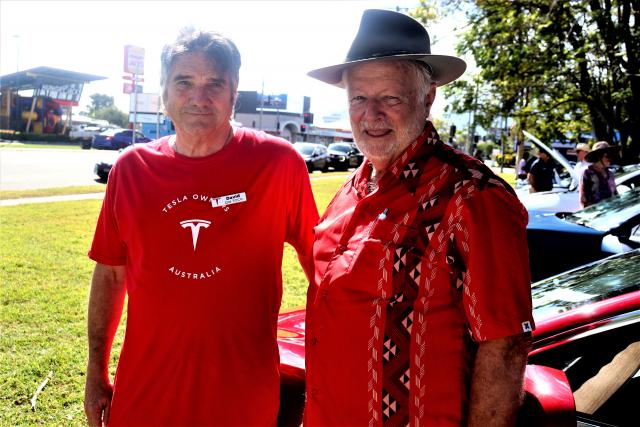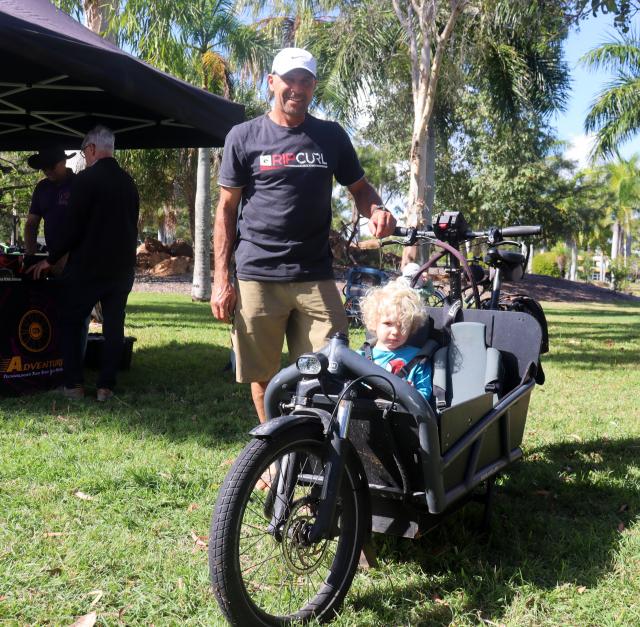
By Matthew Pearce
Central Queensland’s electric vehicle owners were abuzz about EVs at their gathering at Central Park on Saturday, 3 June.
Organiser Arthur Hunt said the Rockhampton electric vehicle (EV) display, which follows a similar event last year at Yeppoon, had been a big success, featuring cars owned by locals, as well as four vehicles from Brisbane and one from Mackay.
All up, nine different brands were on display, including Tesla, Nissan, Polestar, MG, Volvo, BYD, Porsche and Kia, as well as motorbikes, bikes and scooters.
Representatives from the Department of Transport and Main Roads were also on hand to discuss Transport Minister Mark Bailey’s announcement that 44 new EV chargers would be installed in more than 30 Queensland towns to create an ‘Electric Super-Highway’.
There are up to 100 EV owners in Rockhampton and the Capricorn Coast, and the growing community even has their own Facebook group.
“I’m finding that more and more people are seriously considering that their next car will be electric,” Mr Hunt said.
The enthusiastic EV owner has done about 65,000km in his three-year-old Tesla Model 3, travelling to Brisbane and Melbourne.
While regional areas have been slower to take up electric vehicles than their counterparts in the cities, Mr Hunt said country people, with higher travel costs, actually had the most to gain.
Yeppoon dad Jens Mueller also attended the display, showing off his fully electric Riese and Muller cargo bike with a carrying capacity of 200kg – which includes his children, who have started preferring the bike to his car.
Mr Meuller said the electric bike, which is a popular mode of transport in Europe, only needed charging about once a week, didn’t need to be registered and had a speed limit of 25km.
“Yeppoon is not really very big, so it’s easy to get around on the bike, all without producing emissions,” he said.
“The school run takes me five minutes, the same as in a car, and you can do a normal shop at Coles easily.”
Mr Muller said he felt Livingstone Shire needed more provisions for cyclists., with many streets needing better access.
EV journalist David Waterworth, who works for cleantechnica.com, said attitudes toward electric vehicles were changing, thanks to increased familiarity and the election of the ALP at the last federal election.
“Up to the end of last year there was a fair bit of antipathy, but this year, we’ve found that the general public is curious, willing to listen and taking electric vehicles seriously.”
Mr Waterworth, who owns a 2019 Tesla Model 3, said EV sales were rising fast in Australia, going from 0.8 per cent of new car sales two years ago to eight per cent in the first quarter of 2023.
Besides the benefit to the environment, he said electric vehicles were fun and had hip pocket benefits as well.
“We used to spend on average $100 a week in petrol, now we’re not spending any money at all, and there’s no oil changes, no maintenance,” he said.
With his car able to be charged overnight at home, Mr Waterworth said charging stations were really only needed for highway travel.
One of the biggest issues affecting the take-up of EVs is price, and Mr Waterworth said that wouldn’t be an issue soon, with less expensive models on the way in the coming months.
“At the moment you’re paying $36,000 to $40,000 for a Toyota Corolla hybrid, and by the end of the year you’ll be able to buy an electric car for the same price, in addition to a $6000 rebate and cheaper registration,” he said.

